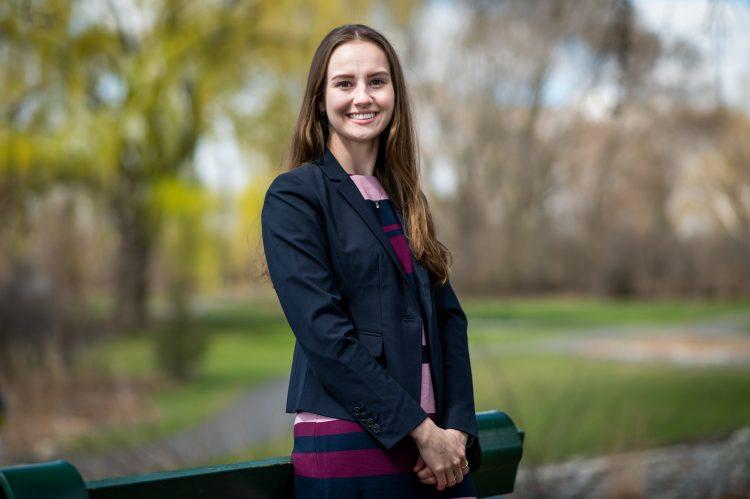-
About
- Leadership & Faculty
- News & Events
-
Academics
- Graduate
- Advanced Clinical Training
- Continuing Education
- Academic Departments
- Academic Offices
- Simulation Experiences
-
Student Life
- Offices
-
Research
-
Hospitals & Clinics
- Emergency Care
- Hospital Services
-
Community Outreach
- Volunteer
How One Graduate Launched a Career in Infectious Disease Amid a Pandemic
At Cummings School, Brooke Howland, VG20, developed her passion for infectious disease diagnostics and landed a dream job in research

By Meredith Berg
It’s an interesting prospect to be studying infectious diseases when an actual pandemic occurs.
But Brooke Howland took it in stride. In fact, she’d already closely studied the Severe Acute Respiratory Syndrome (SARS) outbreak of 2002-2003. “We did a case study on SARS in the course Global Health and Threats of Emerging Pandemics. Then, two months later, we’re back at SARS, but worse. And it was actually going to become a pandemic,” said Howland, who finished the Master’s in Infectious Disease & Global Health program at Cummings School of Veterinary Medicine in August 2020 and will attend commencement in May 2021.
She said, however, that finishing graduate school during the COVID-19 pandemic was helpful in one aspect, because by the time of her graduation, the full shift to remote school and work had occurred, which made the remote interview process for jobs “seem normal,” she said.
If her career path is any indication, Howland is thriving. She first landed at the Broad Institute of MIT and Harvard working on drug discovery and data analysis projects at the institute’s Center for the Development of Therapeutics.
More recently, she began a job in March at a startup called Kephera Diagnostics. The company’s mission closely aligns with Howland’s passion to develop diagnostics for neglected infectious diseases, such as Lyme disease, Chagas disease, and the Zika virus.
“I love it. I’m so excited to go work every day. It’s really interesting research,” she said. “A lot of times, we don’t have the proper vaccines or diagnostic tools that are important to stop the spread of these diseases.”
In the case of Chagas, which is prominent in Latin America and spread by insects, there is no vaccine. Though Chagas starts as an acute infection, it can cause chronic heart issues. Often people are not diagnosed with it, but if they get a diagnosis, the treatment lasts 60 days. Eventually, though, many people stop treating the disease because it is so hard on the body, Howland said, adding that it’s also hard to determine if treatment was effective.
When it comes to her time at Tufts, Howland said the support of her mentor Amanda Martinot, assistant professor in the Department of Infectious Diseases and Global Health at Cummings School, was instrumental to her success. “She gave me the latitude to pursue my own ideas and provided me the support I needed to go above and beyond. She really allowed me to flourish,” she said.
Howland cited a research proposal she completed on equine infectious disease that Martinot encouraged her to pursue, despite its narrow application for the rest of the world. Howland said she felt drawn to the research because she herself has a background in equestrian sports and was pleasantly surprised to receive support from Martinot.
The accessibility of Martinot and other professors were keys to her success, said Howland. “They can answer any question, and they’re always available. The teaching style is not similar to a large university at all. The professors want to help students achieve their goals and passions. It feels like you’re actually working toward what you want to do in life,” she said.
In all, Howland said during her time at Cummings, she worked “harder than I’ve ever worked before,” but it was worth it in the end. Howland learned how to manage her time to include work and play with fellow classmates. She had some clear advice for incoming students: Manage your time, too, so you can go to trivia night on Wednesdays at the Post Office Pub in North Grafton.
Department:
M.S. in Infectious Disease and Global Health